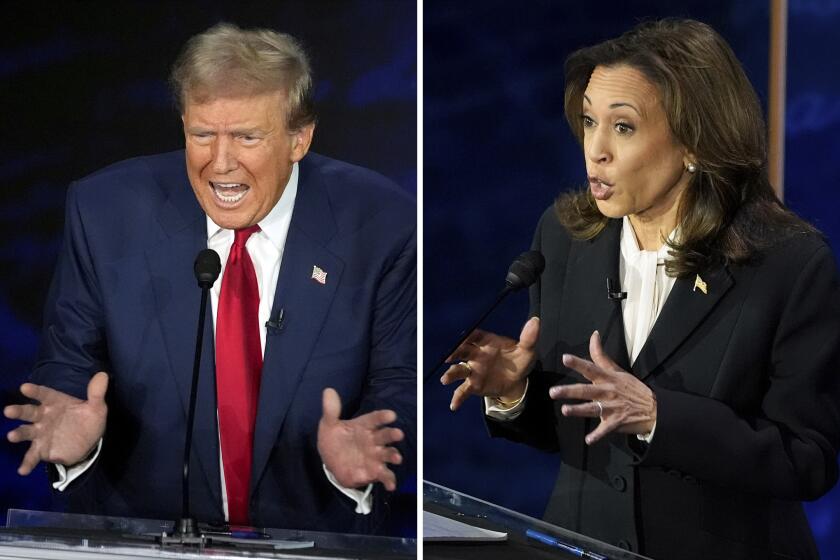Chastened Governor Tries Softer Tone With Educators
The atmosphere has changed around the Capitol. The air is less polluted, especially between Gov. Arnold Schwarzenegger and the school lobby.
That bodes well for California’s 6.3 million public elementary and high school students. Their campuses will be getting more money. And, presumably, they won’t have to cover their ears while the grown-ups -- the governor and teachers union leaders -- call each other liars.
In his State of the State address tonight, it’s a good bet the more conciliatory governor won’t be barking again about “union bosses.” That alone will contribute to a healthier climate in Sacramento.
This is how bad it got last year: Schwarzenegger administration officials would only meet with school advocates in hidden, out-of-the-way places, for fear of being spotted and raising suspicions about renegade negotiating or tipping off special election strategy to the enemy.
“I’ve been in this business for 30 years,” says Scott Plotkin, executive director of the California School Boards Assn., “and I’ve never had to go to some dark and dank coffee shop on the edge of town to meet with people. Things got so dark-edge. I found it very odd.
“They felt they couldn’t be seen with me, because somebody would think they were negotiating on the side. I was just trying to keep the lines of communication open.”
It happened “at least a dozen” times, Plotkin says. “It was pretty scary stuff. Kind of like Watergate. One gentleman kept looking around, making sure that nobody was lurking who might spot us, even though no Capitol denizen was anywhere in sight.”
By contrast, when Plotkin went to meet with administration officials Tuesday, he walked right into the Capitol, through the big doors of Schwarzenegger’s office, and took a seat in the Governor’s Council Room.
There he listened with several other school advocates as the governor’s new education advisor, former San Diego Supt. Alan Bersin, outlined Schwarzenegger’s latest funding proposal.
What it boiled down to -- cutting through all the Proposition 98 jargon -- was that Schwarzenegger offered to keep one-third of the funding promise he made to the school lobby two years ago in a budget deal that he later reneged on to avoid raising taxes.
Education interests say they’ll be owed roughly $5.5 billion by the next fiscal year beginning July 1. Schwarzenegger will place about $1.7 billion of that in his budget proposal to be sent to the Legislature next week. “A down payment,” is how it’s characterized by the ed lobby.
Schwarzenegger isn’t characterizing it. But he does admit to owing the schools money, while not saying how much. And that’s a big step from last year.
It’s the most significant facet of Schwarzenegger’s school proposal. It’s more important than the details of the original deal, or how the latest offer adds up, or the grand total he’s offering kindergarten through community college ($54.3 billion, a $4.3-billion increase).
Much more crucial is that the governor now says he’s willing to seriously negotiate with the Legislature and schools over money and the timetable for future check deliveries.
“We agreed to disagree” on details, Bersin told reporters, “but we agreed that the doors would be open to discussion.”
Schwarzenegger wants to avoid at all costs fighting the school community again this year after the pounding he suffered in November, particularly from teachers unions.
He especially doesn’t want to be battling Democrats over school funding at budget time next summer as he’s running for reelection. He’d really like to maneuver Democrats into demanding a tax increase for welfare benefits.
The governor doesn’t actually have any choice but to negotiate over school funding -- and from a position of weakness. But nevertheless he is scoring points with a softer tone.
“He’s trying to be constructive, and emphasizing this [budget proposal] is a starting point,” Plotkin says.
Schwarzenegger spoke briefly to the education group. “He wasn’t contrite,” Plotkin reports, “but he emphasized he wanted to put last year behind us and learn from that.”
The inexperienced governor learned the hard way that in Sacramento compromise is usually more effective than confrontation.
Another school advocate who attended the briefing was Lynne Faulks of the California Teachers Assn. Before the governor arrived, “it got very frank” with Bersin, she says. “People told him, ‘This might be nice, but this isn’t the calculation we’ve made. We’re still owed more than $3 billion.’
“But we also talked about how important it was that neither side go crazy in the press. If they started saying derisive things -- like ‘You can never give them enough money!’ -- that would make it difficult to have a conversation.”
So far everyone is behaving.
“It’s certainly a completely different [Schwarzenegger] strategy than last year,” says Joe Nunez, the CTA’s lead political strategist. “Last year they called us in one hour before the [State of the State] speech and laid on us that they were breaking a deal. This year they called us in one day before and laid a certain amount of money on the table.”
From the schools’ mellowed perspective, Plotkin says, “we’ve all gone through our period of venting about last year. We’re done with that.”
He also is done with dark, dank, hidden coffee shops and is back lunching with administration officials at “see and be seen” restaurants around the Capitol.
*
George Skelton writes Monday and Thursday. Reach him at george.skelton@latimes.com.
More to Read
Get the L.A. Times Politics newsletter
Deeply reported insights into legislation, politics and policy from Sacramento, Washington and beyond. In your inbox three times per week.
You may occasionally receive promotional content from the Los Angeles Times.











